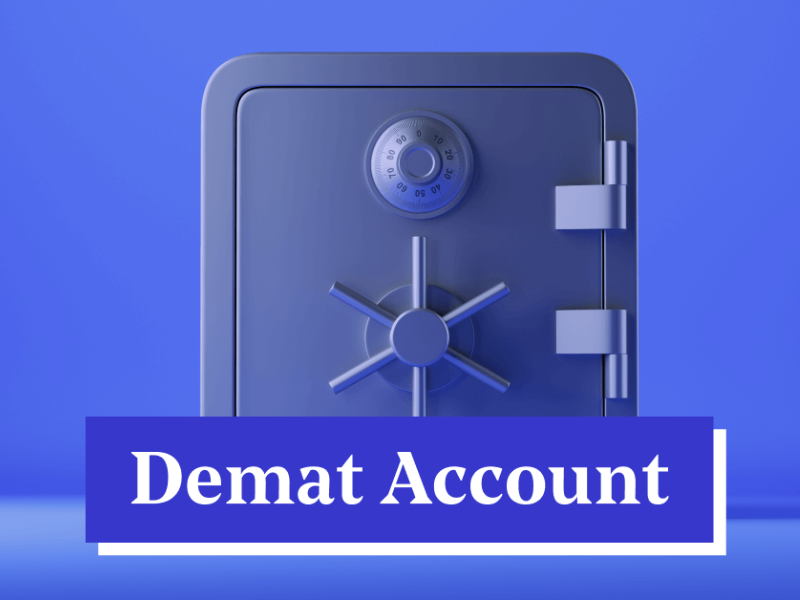Interested in exploring the stock market? If yes, then you might be familiar with the term ‘Demat Account’. This article will help you navigate the Demat account meaning, features, types, and process of opening a Demat Account.
What is a Demat Account?
A Demat Account, commonly known as a Dematerialized Account, acts similarly to a traditional bank account, where you store and trade all your shareholdings or securities instead of cash. It serves as a centralized platform that holds all your investments, such as shares, bonds, exchange-traded funds and mutual funds in an electronic format.
Features
- Safe and Secure – A Demat Account holds all the investment securities safely and securely in digital format.
- Convenience – Physical share certificates can be conveniently converted into electronic format (dematerialized) and vice versa.
- Quick Transfers – Shares can be easily transferred.
- Easy to Trade – Shares can be bought and sold with just one click.
- Eliminate Fraud and Forgery – Physical share certificates carry the risk of forgery and fraud. Demat accounts eliminate such risks.
- Avail Loan – You can even avail of a loan by using the securities in your Demat Account as collateral.
Types of Demat Account
There are majorly three types of Demat Accounts for investors in India.
- Regular Demat Account: This type of account is mainly for the citizens (Indians) residing in the country (India). This account is the best option for investment and equity trading.
- Repatriable Demat Account: This type of Demat Account is feasible for Non-Resident Indians (NRIs). International money transfers are possible with this account. It has to be linked to a Non-Resident External (NRE) bank account.
- Non-Repatriable Demat Account: This type of Demat Account is also for NRIs, but here international funds transfer is not allowed. It has to be linked to a Non-Resident Ordinary (NRO) bank account.
How to Open a Demat Account
Opening a Demat Account isn’t a complicated process. Below are the steps taken to open a Demat Account online:
1. Select a reliable Depository Participant (DP) – Selecting a reliable and experienced Depository Participant (DP) is one of the most important steps of opening a demat account.
A depository functions as a storage unit for all digital shares and securities. In India, there are two major depositories – Central Depository Services Limited (CDSL) and the National Securities Depository Limited (NSDL). These depositories provide a list of DPs with whom you can choose to open a Demat Account.
Depository Participants are registered mediators between investors and depositories. Their scope of work involves facilitating seamless securities trading experiences for investors. Banks, financial institutions, stock broking firms, and other investment platforms in India provide DP services.
You can choose a reliable Depository Participant based on various factors, such as experience, expertise, services, brokerage charges, annual charges, and more.
2. Fill out the Account Opening Form – After choosing the DP, you’ll be required to visit their respective website and fill out the online Demat Account Opening Form.
3. KYC Verification Documents – Once the form is filled up, you’ll need to provide the following list of documents:
- Aadhar Card
- Pan Card
- Bank Statement
- Residency Proof
- Income Proof
- Passport-Size Photographs
4. Signing Agreement – You’ll be required to sign an agreement with your selected DP, once all the verifications are done. The agreement will define all the terms and conditions, rules and regulations, charges and more that you and your DP will be required to follow strictly.
5. Demat Account Details – Once your application is approved, you’ll be provided with a unique Beneficial Owner Identification Number (BO ID) and account number. The given credentials will help you access your online Demat Account.
How to Choose The Right Depository Participant?
As said earlier, choosing the right DP is one of the important steps in the process of opening a Demat Account. There are certain criteria you can evaluate before picking any DP. If you have full-grown experience in trading, then a discount broker could be a good option for you. For choosing a discount broker, you can examine various factors like the reputation of the broker, the platforms and tools they provide, and more.
On the other hand, if you are new to the world of trading, it would be helpful for you to opt for a full-service broker. Besides providing an advanced trading platform, a full-service broker offers a variety of services with expert support that can enhance your investment experience. So, if you are looking to navigate seamlessly through the investment world, consider opening your Demat Account with Choice. Choice is one of the reputed full-service brokers in India, having over 25 years of experience in providing financial services!
Disclaimer: Please note that while this article aims to provide accurate and up-to-date information, it should not be considered as official financial advice. Always make sure that you thoroughly research before making any financial decision.


